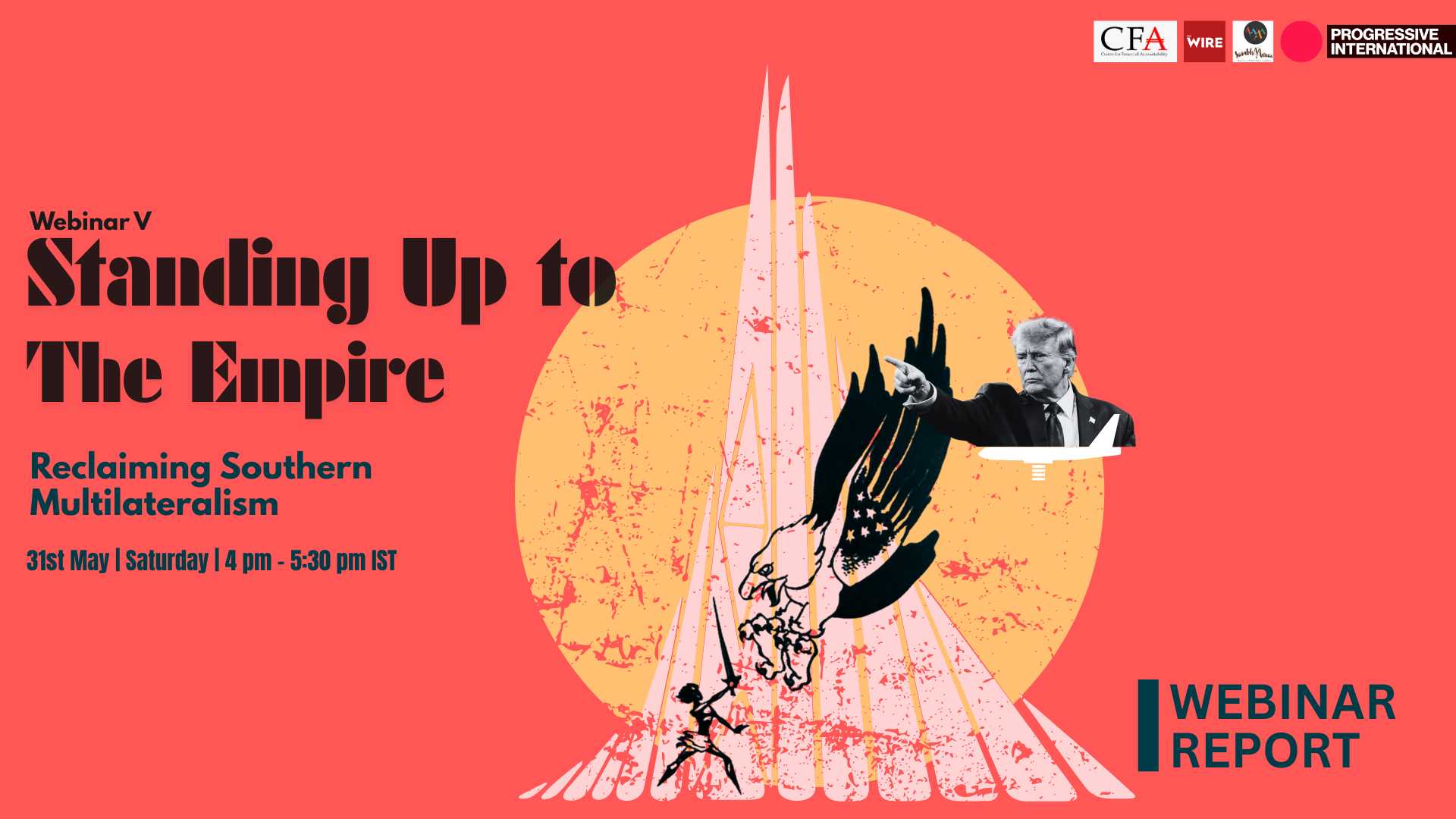 The fifth webinar in the Political Economy of the Trump Era series examined the historical exclusions and contemporary fractures of the multilateral system through the lens of the Global South. Titled “Standing Up to the Empire: Reclaiming Southern Multilateralism”, the session interrogated the structural foundations of the international system, shaped by colonial legacies, U.S. hegemony, and capital-driven globalisation and asked the fundamental question – what it would mean to rebuild multilateralism rooted in the values of equity, justice, and democratic sovereignty.
The fifth webinar in the Political Economy of the Trump Era series examined the historical exclusions and contemporary fractures of the multilateral system through the lens of the Global South. Titled “Standing Up to the Empire: Reclaiming Southern Multilateralism”, the session interrogated the structural foundations of the international system, shaped by colonial legacies, U.S. hegemony, and capital-driven globalisation and asked the fundamental question – what it would mean to rebuild multilateralism rooted in the values of equity, justice, and democratic sovereignty.
The discussion underscored that the current crisis in multilateralism is not a rupture, but rather a continuation of decades-long manipulation by powerful Northern states. The so-called multilateral order, they argued, has always been asymmetrical, serving the interests of capital and empire rather than the development needs of the South. From the Bretton Woods institutions and GATT to the WTO and IMF, the Global South has remained marginal to the decision-making core, despite periodic assertions of autonomy through forums like UNCTAD, the Non-Aligned Movement, or the G77.
The discussion traced the arc of Southern resistance, from the Bandung Conference of 1955 and the demands for a New International Economic Order in the 1970s to contemporary struggles against Investor-State Dispute Settlement (ISDS) regimes, debt crises, and climate colonialism. The webinar foregrounded how the ideology of neoliberalism which promotes deregulation, financialisation, and corporate capture of governance has undermined collective action, eroded developmental policy space, and deepened social and ecological crises across the South.
Speakers also critiqued the limitations of existing platforms like BRICS, noting that while they may symbolise Southern assertion, they remain embedded in capitalist frameworks and do not offer a meaningful alternative to the structures of global domination. At the same time, they drew attention to emerging possibilities from African leadership in pushing for a UN Tax Convention to the slow momentum around a binding treaty on transnational corporations and human rights. The speakers stressed the importance of reclaiming democratic sovereignty not only internationally, but within Southern states themselves, many of which are now governed by authoritarian or elite-driven regimes that suppress dissent and serve transnational capital.
Crucially, the webinar called for a radical reimagining of multilateralism, not simply as a redistribution of seats at Northern-dominated tables, but as a structural transformation of global governance itself. This means rebuilding economic self-reliance, reversing austerity and privatisation, creating public-public partnerships, investing in agroecology, public health, and mission-oriented innovation, and strengthening regional cooperation outside imperialist frameworks. It means restoring the agency of peoples’ movements, labour, and civil society to shape the global agenda, not through elite diplomacy but through transnational solidarity and resistance.
This webinar included speakers Bishwajit Dhar, Shalmali Guttal, Guillaume Long, and Dinesh Abrol, and the discussion was moderated by Jahnavi Sen
Read and Download the report here: Standing up to the Empire: Standing Up to the Empire: Reclaiming Southern Multilateralisms | Webinar Report
Centre for Financial Accountability (CFA), in collaboration with The Wire (as media partner), Sambhaavnaa Institute, and Progressive International, is co-organising this eight-part webinar series titled ‘The Political Economy of the Trump Era: Challenges & Opportunities of the Shifting World Order’, conceived to better understand the global moment we are all inhabiting.
Read more about the webinar series here.
Centre for Financial Accountability is now on Telegram and WhatsApp. Click here to join our Telegram channel and click here to join our WhatsApp channeland stay tuned to the latest updates and insights on the economy and finance

